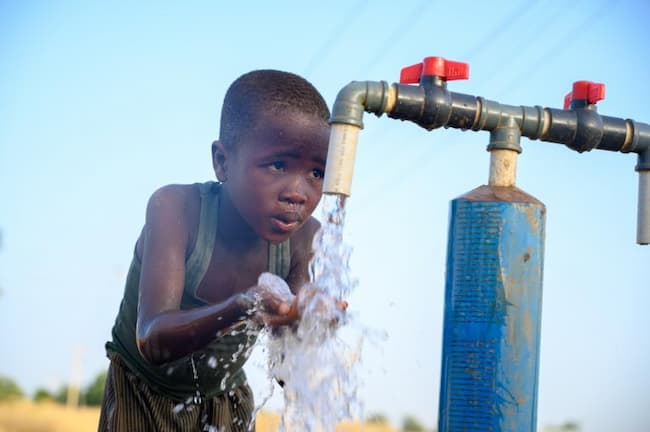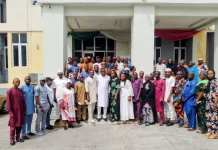Water is an essential resource with a direct impact on Africa’s economic potential: inadequate access to safe water, sanitation, and hygiene services reduces economic opportunities.
One in three Africans is affected by water scarcity. According to the 2022 WHO/UNICEF JMP report, 411 million people in Africa still lack basic drinking water services, 779 million lack access to basic sanitation services and 839 million lack access to basic hygiene.
Climate change is causing water scarcity and drought, leading to projected water scarcity for close to 230 million Africans and as many as 460 million living in areas where demand for water periodically exceeds the available supply by 2025.
This also impacts food and energy security as the continent’s population continues to grow. Water access remains a matter of concern and efficiency in water use is now a crucial issue.
The theme of World Water Day 2023, “Accelerating change” is a wake-up call to do even more to solve water and sanitation crises. We need collective and urgent action by governments, regional associations, and global development partners.
We must also consider the complex interplay between water and energy supply and demand, food ecosystems and the impacts of climate change to address the diverse needs and use of water, develop innovative ideas, and optimise finance in the water sector.
This year’s World Water Day also coincides with the United Nations’ midterm review of the Water Action Decade. This provides an opportunity for leaders, governments and corporations to pause, reflect and determine urgent actions that are needed to increase the speed of progress in delivery on universal access to water and sanitation.
Together, these commitments form the Water Action Agenda that will be launched at the UN 2023 Water Conference (22-24 March) – the first event of its kind in nearly 50 years.
Within the African Development Bank’s High 5 strategic priorities, water security underpins food security (agriculture represents 70% of total water consumption), energy security (high dependence on hydropower, and water is an input for other sources of energy), industrialisation (water as a key input and catalyst), regional integration (through transboundary waters) and particularly improving the quality of life for the people of Africa (impacts on health, nutrition, education, gender equity and livelihoods).
The bank’s Water Policy is built on a vision to improve Africa’s water security, and transform water assets to foster sustainable, green and inclusive socio-economic growth and development.
Massive investments in integrated water development and management are central to achieving sustainable water, food and energy security while assuring green and inclusive growth.
In 2022, our water and sanitation portfolio of $473 million provided water access to an estimated 6.8 million people, and jobs to over 24,000 people in Africa.
Over the last 10 years, the bank has also invested approximately $5.2 billion in the water sector to support and strengthen water and sanitation resilience for almost 97 million people in Africa. Since 2015, the bank has invested an average of $900 million a year.
In Kenya, projects like the Kenya Towns Sustainable Water Supply and Sanitation Program have improved the quality of life for beneficiaries such as Emmaculate Anyango, who used to walk two kilometres to fetch water for cooking, drinking and other domestic uses.
The program initiated projects to ensure access to clean, safe, and consistent water supply in 28 small towns in Kenya. For instance, the Oyugis Water Supply and Sanitation Project, which was completed in January 2023, already serves over 60,000 people by producing 12,000 cubic meters of water each day.
Towards 2030 and beyond, the African Development Bank will continue to work with and support African countries to drive achievement of Sustainable Development Goal 6 targets.
It will do this through financing, sector reforms and governance, knowledge generation, partnerships and private sector engagement, environmental and social responsibility, and mitigating the impacts of climate change.
Let’s all play our part and be the change!













